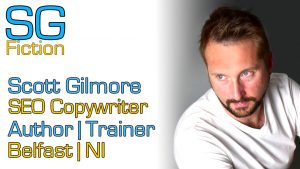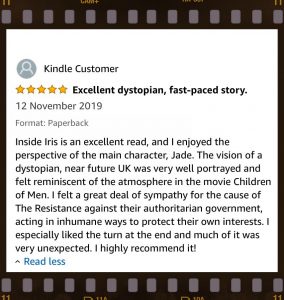SEO Copywriter: 5 Tips To Help All Authors Get More Web Visits In 2020
As an independent or self-published author, marketing your novel can be left up to you. Check out my 5 freelance SEO copywriter tips for writers in 2020.
Scott Gilmore: SEO Copywriter & Indie Author
As I have been working as a freelance SEO copywriter over the past while, I have learned so much. I have been able to apply much of this learning to my own author website and creative writing blogs. Many writers out there may have found website creation, Search Engine Optimisation (SEO), and content creation for blogs something of a minefield.
Knowing where to start with such a vast area can be daunting for someone who has never done it before. I was in that boat when I set up my SG Fiction website initially through WIX. I sat in front of my computer with a blank screen wondering what on earth I would fill it with.
Faced with such a horrible situation, I know exactly how many young and first time authors feel when it comes to marketing themselves online. Knowing what to write about yourself as well as how to write it to ensure the information is found on Google is not an easy task to complete.
By working through digital marketing training in Belfast, I have gained so much knowledge that I didn’t have before. I have been able to add digital marketing training to my Master’s Degree in Creative Writing, creating blogs for clients as a freelance copywriter in Belfast.
Through researching SEO for my own online author profile, as well as the digital training courses I provide in Belfast, I have boosted my SG Fiction online profile a lot. For this blog, I included 5 freelance SEO copywriter tips that independent authors and self-published writers can use in 2020.

Click on the image to watch Episode 5 of Scott’s YA Writing Tip series, The Forge, on the SG Fiction YouTube Channel.
Know Your Market
Every author should have some idea of the market into which they hope to publish their book. Whether you publish traditionally, independently, or self-publish, the marketplace is crowded for so many novels, novellas, collections of poetry, and plays. Spending some time researching the genres can be invaluable for sales, but also for Search Engine Optimisation (SEO).
Rather than thinking of yourself solely as an author, it can be worthwhile considering yourself as a business or business person. If you were selling a product or service to clients that was not a book, you would conduct stringent market research, check out competitors, and make a business plan.
As authors, we look at our work as a passion, many of us forget that we are businesspeople as well. We are selling a low-priced product to people in a crowded marketplace. We are competing against some titanic names with substantial marketing budgets to help their book sales.
I we are to make a mark at all on the market we hope to break into, knowing it as well as we possibly can is vital. Use search engines, book stores, author website, etc. to see what they do. Only by doing that, will you be able to aim your focus and marketing campaign in the right direction.

In 2020, Scott hopes to welcome some guest bloggers to the SG Fiction site. If you’re interested, email Scott to enquire.
Keyword Research
Online, multiple premium keyword research tools assist marketers and businesses target ad campaigns and SEO. By using such tools, products and companies can work to ensure that their ads, website content, blogs, and other digital content reaches the appropriate people. In turn, this can help generate leads, sales, and profits.
Unfortunately, we as writers are mostly unable to afford such luxuries. However, free tools such as Google Keyword Planner and Google Trends allow some analysis of keywords and their popularity by people searching on Google.
There is no guarantee that researching popular words and terms will generate sales on your website or Amazon. However, it will mean that people will be able to find your website, learn about you and your book, then consider purchasing it via links to Amazon or a sales page.
By searching 5 to 10 keywords and phrases, you will be able to have a benchmark to make a start on your SEO. These terms will help you to plan the content and direction needed to make inroads in 2020.
Compile A Keyword Database
You have gathered a list of 5 to 10 keywords and phrases. Before that, you carried out some market research for your genre and the demographics you want to pitch it. Now it’s a case of compiling a database of the keywords you hope to use over the coming months and year.
As a freelance SEO copywriter, a right place to store these words is in a spreadsheet but, failing that, writing them down into a book is good. It can also be a good idea to consider where you will use the words within the content you are about to create. If you talk about creative writing blogs and blogging, that will obviously be used primarily in your blog section and content. If you talk about audio/video content and YouTube, that would be focused on your Latest Media page. By taking time to think about how you will use these words, you will utilise them more effectively within your online Search Engine Optimisation (SEO) strategy.
It is important to remember that Google can take 3 to 4 months to effectively catalogue and rank the information on your website. Therefore, giving the words time to work is paramount, so don’t constantly chop and change what you are doing on the site. Trust the research and the keywords in the database you have gathered. You can always consider revising them at a later date when we review how effective our keywords were.
SEO Copywriter: Use Keywords In Your Content
The fourth step you should consider in my Freelance SEO Copywriter Tips For Authors list is to use the keywords within your content. You can do this by:
- Creating a blog content calendar,
- Compiling a social media content calendar, and,
- Building an organised approach to your YouTube content creation.
By planning out the content that you hope and wish to create over a period of days, weeks and months, you will be able to consider how you are going to effectively use your database of keywords. You will want to have a relatively broad spread of the words and phrases across the site pages, blog, headings, and images. This can make sure Google knows exactly what it is cataloguing and ranking.
There is also a chance that we authors will embellish on the words we hoped to use and go off on a tangent. We know we shouldn’t but, considering we are wordsmiths, it is almost unavoidable. Here, with SEO, we need to do our best to use the words, or close variations as much as possible. Ultimately, we want a keyword density within our content to help Google rank our website and our blogs, so use the keywords within your content, friends.

Click on the image to see the fiction books I have released so far. Both Inside Iris and Anna’s Awakening are available for purchase on Kindle and paperback from Amazon.
Learn To Label
My final piece of Search Engine Optimisation (SEO) advice for writers is to learn to label all areas of your website and content appropriately. Yes, it is fantastic to write some of the most eloquent, poetic verse in your prose, poetry, or a monologue in your Beckettian drama. However, if you are unable to label your webpages and blogs appropriately, it can spell disaster for your website and content being found on YouTube or a search engine.
SEO best-practices include:
- Provide clear, deep, engaging, and easy-to-find content on your site.
- Keep page titles clear and relevant.
- Links are regarded as a signal of popularity and Bing rewards links that have grown organically.
- Social influence and social shares are positive signals and can have an impact on how you rank organically in the long run.
- Page speed is important, along with a positive, useful user experience.
- Use alt attributes to describe images, so that Bing can better understand the content.
(Source: Moz.com)
The list above, shares some of the basic Search Engine Optimisation practices a beginner to SEO can consider as they learn how to label content on their website and a blog. The MOZ.com hyperlink contains plenty of information for fellow authors and writers who may want to learn more about SEO if working on their own website.
By learning how your website and blogs are labelled, you will optimise your author website and profile’s chances of being found on Google. There are many other factors involved in marketing and Search Engine Optimisation. However, using the 5 SEO tips above can help set you on the right path for the coming year as a fellow author and writer.

Are you a young writer between 16 and 25? if you would like to appear in the Young Writers’ Blog, Type Cast, email Scott to enquire for 2020.
SEO Copywriter Tips: The Takeaway
As a Freelance SEO Copywriter in Belfast, I love what I do. I have always been someone who has had a positive approach to learning new things in all aspects of my professional life. Therefore, I wanted to pass some of what I have applied to my SG Fiction website to my fellow authors and writers in the online writing community.
There is no doubt that other many indie and self-published writers could use much of what I included in this article. I sincerely hope it helps plan our your online author plan of attack for 2020.
In the coming year, I hope to develop even further as an author, a writer, a digital trainer, and a freelance copywriter. Anyone who knows me would share how determined I am and how I use my hyper-organisation to its maximum. I am full to the brim with excitement and optimism for next year and what it could hold for Scott Gilmore & SG Fiction.
What about you? Comment below.




You seem to be learning loads in your new job! Will definitely think about these points coming in to the New Year!
Thanks! I am. I love it! Hoping to make 2020 go from strength to strength with the new book and the copywriting! Keep reading and commenting on my blogs too.